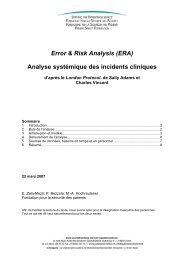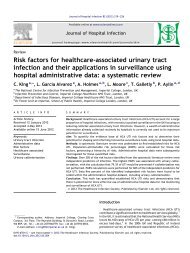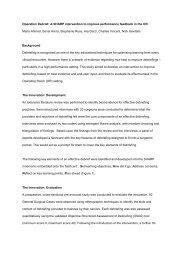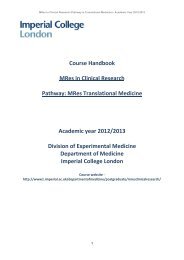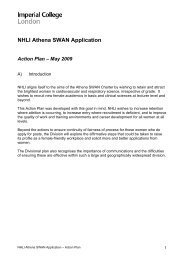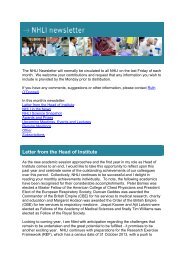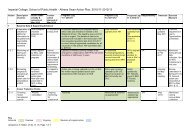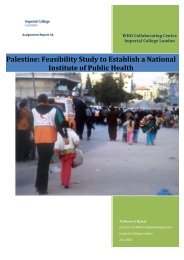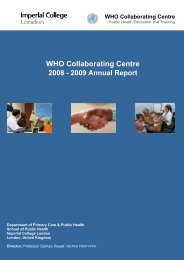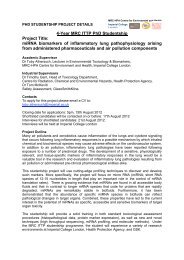Degree of perceived support from professionalsThere is strong professional consensus from the BMA, RCGP and GMC for the principles of codingethnicity and first language. Soljak et al. (2007) comment that “there is a high level of awarenessof the importance of ethnicity as a disease risk factor, and many practices appear to be usingethnicity as an indicator of risk for clinical management purposes already”.Degree of perceived support from patients and carersThere is support from a number of patient organisations including Diabetes UK for the principlesof coding of ethnicity and first language.It is important to note that ethnic monitoring still arouses suspicion for some people who maysee the process as a means of further discriminating against them. The reasons for ethnicmonitoring should, therefore, be carefully explained, and analyses and decisions, based on theresults of ethnic monitoring, should be openly shared (DoH, 2007).Impact on health inequalitiesCollecting, analysing and using data on ethnic group will enable comparison of “uptake of servicesbetween different groups to ensure fairness in allocation of resources and delivery of servicesaccording to needs and, where appropriate, to address health inequalities experienced byparticular ethnic groups” (DoH, 2007). This process will be enhanced further by the collection andanalysis of data on first language.Ethnic monitoring and data collection of ethnicity and first language are essential steps towardsensuring that the NHS provides equity of access, delivery and outcomes for all service users.Health impactEthnic monitoring and data collection on ethnicity and first language will“…contribute to assessments of individuals' needs and circumstances, thereby ensuringthat access to services and service delivery can be as personalised and appropriate aspossible. For example, insights into a person's ethnic background - or the ethnicbackground of their family - may assist with diagnosis. Information about a person's mainspoken language and competency in English could indicate a need for translation andinterpreting services.” (DoH, 2007)The process will also “assist with the clinical management of patients as the prevalence andcourse of many conditions varies by ethnicity” (DoH, 2007).54
Workload and training implicationsPrimary care staff should already be familiar with the process of ethnic monitoring as it is in thecurrent national <strong>QOF</strong>. However, the existing <strong>QOF</strong> indicator refers to coding for new registrations,and practices will need to put in place a system for collecting data on ethnicity and first languagefor those on the specified chronic disease registers. This process can be facilitated through theuse of templates.Training will be required for primary care staff with respect to the importance of and rationale forethnicity monitoring. Training is critical to the success of collecting ethnic group data, and shouldbe tailored to local circumstances and experiences of ethnic monitoring (DoH, 2007). For details of the proposed training package see section 14.3.5 (p93).ReferencesArai L, Harding S (2002). Health and social care services for minority ethnic communities in the UnitedKingdom: a review of the literature on access and use. Glasgow: MRC Social and Public Health SciencesUnit, University of GlasgowAspinall P and Jacobson B (2006) How to analyse ethnic differences in health, Health care and theworkforce: a toolkit for the NHS. <strong>London</strong> Health Observatory. <strong>London</strong>Department of Health (2007a) The NHS in England; The Operating Framework for 2008/9 Departmentof Health. <strong>London</strong>Department of Health (2007b) A practical guide to ethnic monitoring in the NHS and social care.Department of Health. <strong>London</strong>Department of Health (1999) Saving Lives: Our Healthier Nation. <strong>London</strong>: HMSOGreen G, Bradby H, Chan A, Lee M, Eldridge K (2002). Is the English National Health Service meetingthe needs of mentally distressed Chinese women? J Health Services Research Policy 7:216-21.Free C, White P, Shipman C, Dale J (1999). Access to and use of out-of-hours services by members ofVietnamese community groups in South <strong>London</strong>: a focus group study. Family Practice ;16:369-74.Gerrish K (2000). Researching ethnic diversity in the British NHS: methodological and practicalconcerns. Journal of Advanced Nursing 31:918-25.Gerrish K, Chau R, Sobowale A, Birks E (2004). Bridging the language barrier: the use of interpreters inprimary care nursing. Health and Social Care Community 12:407-13.Hargreaves S (2007) The impact on and use of the UK’s National Health Service by new migrants . PhDThesis. The International Health Unit, <strong>Imperial</strong> <strong>College</strong> <strong>London</strong>. University of <strong>London</strong>Levi S (2005) Barriers to health care and experiences for asylum seekers and recently settled refugeesin East Kent. <strong>London</strong>: University of <strong>London</strong>Lukes S, Bell M. (2002) Renewing West <strong>London</strong>. Refugee communities: their hopes and needs. Abaseline study for Renewal. <strong>London</strong>: Michael Bell AssociatesMurphy D, Ndegwa D, Kanani A, C R-J, Webster A (2002) Mental health of refugees in inner-<strong>London</strong>.Psychiatric Bulletin 26:222-224.ONS. Census 2001 (2002) <strong>London</strong>: HMSO/UK Office for National StatisticsSenior P, Bopal R(1994)Ethnicity as a variable in epidemiological research.British Medical Journal309:327-330Soljak, M, Majeed A, Eliahoo J, Dornhorst A (2007) Ethnic inequalities in the treatment and outcome ofdiabetes in three English Primary Care Trusts International Journal for Equity in Health 6:8Zeuner, D (2008) Annual Report of the Director of Public Health 2007-2008 Hammersmith and FulhamPCT55



